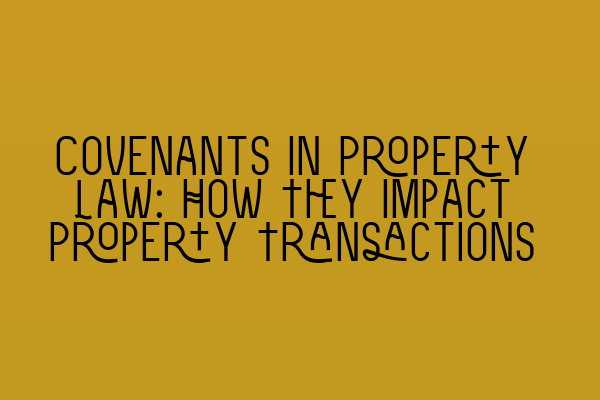Covenants in Property Law: How They Impact Property Transactions
Welcome to SQE Property Law & Land Law! As leading solicitors in the field, we understand the importance of staying up-to-date with the latest legal developments. In this blog post, we will explore the topic of covenants in property law and how they impact property transactions. Whether you are a professional in the industry or a property owner looking to gain a deeper understanding, this article will provide valuable insights.
Before we dive into the intricacies of covenants, let’s start with a basic definition. In property law, a covenant is a legally binding agreement between property owners that imposes specific obligations or restrictions on the use of the property. These obligations and restrictions can be related to various aspects such as maintenance, development, or use of the property.
So, why are covenants important in property transactions? Firstly, covenants help maintain the value and integrity of the properties involved. They ensure that property owners adhere to certain standards and responsibilities, preventing potential issues or disputes in the future. For example, a covenant may prohibit the construction of certain types of buildings or restrict the use of the property for commercial purposes in a residential area.
Additionally, covenants play a crucial role in protecting the interests of all parties involved. When purchasing a property, it is essential to conduct thorough due diligence to identify any existing covenants. By understanding these covenants, you can make informed decisions regarding the property and avoid surprises down the line. It is recommended to engage the services of an experienced solicitor who can assist you with the examination and interpretation of covenants.
Now that we have covered the importance of covenants, let’s delve into the different types that can impact property transactions.
1. Restrictive Covenants: These covenants limit certain actions or activities on a property. They are commonly found in residential areas to maintain harmony, preserve aesthetics, and prevent nuisance. For instance, a restrictive covenant may prohibit the installation of solar panels on the front of a property to preserve the visual appeal of the neighborhood. It is essential to understand and comply with these covenants to avoid potential legal issues.
2. Positive Covenants: Unlike restrictive covenants, positive covenants require property owners to actively do something. For example, a positive covenant may oblige property owners to contribute to the maintenance and repair costs of shared facilities, such as roads or communal gardens. These covenants help ensure the fair distribution of costs and responsibilities among property owners.
3. Freehold and Leasehold Covenants: Covenants can also differ based on the type of ownership, i.e., freehold or leasehold. Freehold covenants are binding on the property itself and are applicable to all future owners, regardless of whether they were party to the original covenant. On the other hand, leasehold covenants are specific to leasehold properties and generally apply only for the duration of the lease.
Now that we have covered the basics of covenants and their significance, understanding how they impact property transactions becomes crucial.
When buying or selling a property, it is vital to thoroughly review the existing covenants. As a buyer, understanding the restrictions or obligations associated with the property can influence your decision-making process. It is advisable to engage a solicitor who specializes in property law to review and interpret these covenants to ensure compliance.
Similarly, as a seller, disclosing any relevant covenants to potential buyers is important. Failure to disclose such information can lead to disputes in the future and, in some cases, legal action. By being transparent about the covenants associated with the property, you can maintain a smooth and lawful transaction.
Navigating the complex world of covenants in property law may seem daunting, but with the right expertise and guidance, you can confidently handle property transactions.
At SQE Property Law & Land Law, our team of highly skilled solicitors is dedicated to providing reliable legal advice and services to individuals and businesses alike. Whether you require assistance with property transactions, covenant interpretation, or any other property-related matters, we are here to help.
For more information about SQE 1 Practice Exam Questions, SQE 1 Practice Mocks FLK1 FLK2, SQE 2 Preparation Courses, SQE 1 Preparation Courses, or SRA SQE Exam Dates, please feel free to visit the following related articles:
– SQE 1 Practice Exam Questions
– SQE 1 Practice Mocks FLK1 FLK2
– SQE 2 Preparation Courses
– SQE 1 Preparation Courses
– SRA SQE Exam Dates
In conclusion, covenants are a vital aspect of property law that impact property transactions. Understanding and complying with these covenants is essential for property owners and buyers to safeguard their interests and avoid potential disputes. To ensure a smooth and lawful transaction, it is advisable to seek the assistance of an experienced solicitor specializing in property law. At SQE Property Law & Land Law, we are committed to providing comprehensive legal services to help you navigate the complexities of property transactions. Contact us today to learn more or schedule a consultation.
